Genoa bridge collapse: Derby unites a city struck by 'momentous disaster'
- Published
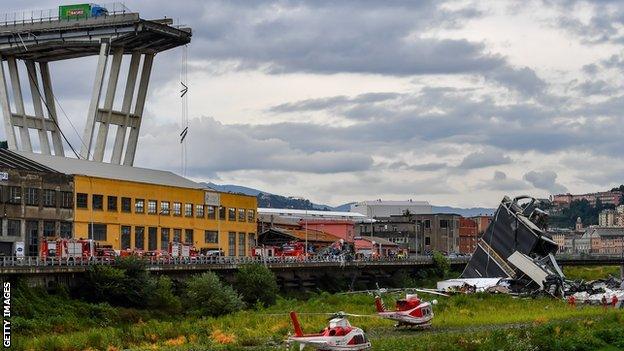
A lorry stopped just short of the precipice, a chunk of road on its side on the ground and several helicopters in attendance - Genoa's Morandi bridge was a scene of devastation following its collapse in August
In the west of Genoa there is a haunting half monument that looms loose in the sky, an unavoidable reminder of the tragic event that shocked this city three months ago.
On 14 August, the Morandi motorway bridge collapsed.
What remains is a severed road that empties into thin air, a structure that shifts and rumbles in high wind. Close to the edge stands a truck, abandoned on the spot when its owner fled on that terrible morning.
The Morandi bridge was part of the fabric of everyday life in this north Italian port city - it was the main entrance point from the west, used by roughly 25 million vehicles every year.
When a 200-metre section collapsed in torrential rain this summer, 43 people died.
They were holidaymakers carrying buckets and spades, locals on their daily commute, maintenance workers on the ground who were buried by concrete and twisted metal.
On Sunday, Genoa's two Serie A football teams - Genoa and Sampdoria - met for the first time since the disaster on an emotional evening at the Luigi Ferraris stadium, a ground the rival clubs have shared since 1946.
BBC Sport reports from a city united in solidarity, anger and hope.
'I was resigned to death. I still dream about it'
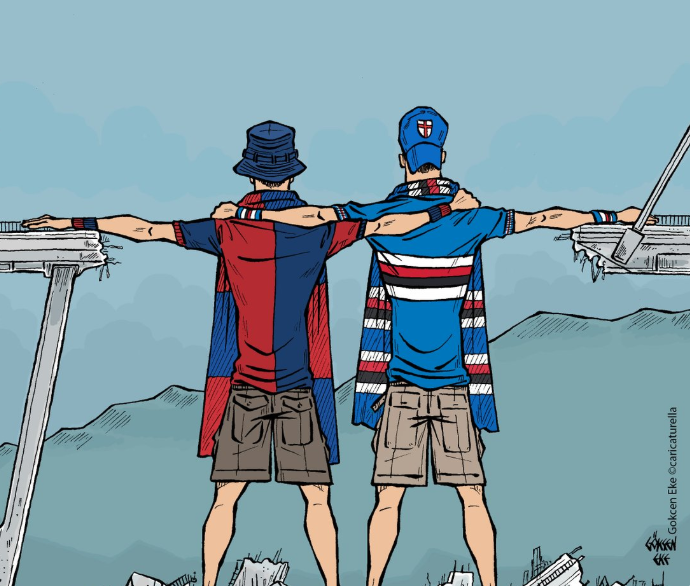
This representation of solidarity between Genoa and Sampdoria fans was widely shared on social media after the Morandi bridge disaster
Davide Capello was one of the survivors. His car plummeted 40 metres and he somehow walked away with barely a scratch. His friends say it is a miracle he is alive.
A former Cagliari and Italy Under-20 goalkeeper, the 34-year-old is now a firefighter.
Having finished work earlier that morning, he was on his way to buy tickets to see Genoa play. The day before he'd gone too, but the office had been closed.
"It was when I had almost reached the middle of the bridge that I heard a deep, loud rumbling noise," he remembers.
"Suddenly I saw the asphalt starting to crumble apart, and I fell.
"My car flew down for about 40 metres before landing, wedged into a gap in a stretch of road that had crashed down in front of me. The airbags exploded all around and broken glass was everywhere.
"I thought I was going to die. I was resigned to it, helpless. But I walked out on my own two feet.
"After a time I could hear the voices of rescuers. I climbed the rubble, up and out onto a street where I could see ambulances.
"I had no major injuries, just a slipped disc."
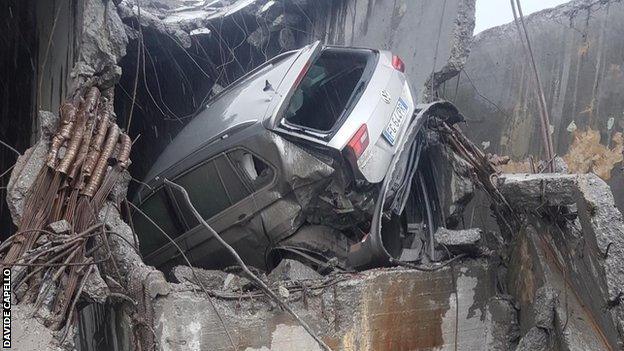
Davide Capello's car lies crumpled in the wreckage of the bridge. He was one of the lucky ones. Among the 43 deaths were a family of three killed when their car crashed to the ground.
We still don't know exactly why the bridge collapsed.
It took its name from engineer Riccardo Morandi. He designed similar bridges in Colombia, Libya and Venezuela before his death in 1989.
The one in Genoa was completed in 1967 and was heralded for its innovative use of materials, but maintenance costs spiralled over the years.
In 2016, Antonio Brencich, a structural engineer who lectures at Genoa University, described it as "a failure of engineering" and said: "There are errors in this bridge. Sooner or later, it will have to replaced."
A 2011 report by the company responsible for its upkeep, Autostrade per l'Italia, said it was suffering from decay. On the day it fell, maintenance work was being carried out on its foundations.
An investigation is ongoing, and Italian prosecutors have been considering charging 20 people with involuntary manslaughter.
"Those responsible owe a great debt to the victims and their families," Capello says. "We have to have answers.
"It was a momentous disaster for the whole of Italy, an enormous tragedy. My survival is a question of a lot of luck. I think about that. I dream about what happened every night.
"I am slowly trying to move forward and return to my previous life although it is not easy because the memory of that day keeps coming back. I cannot forget it.
"It was a brutal experience. But little by little, and with psychological help, I am trying to overcome it and go back to my previous life."
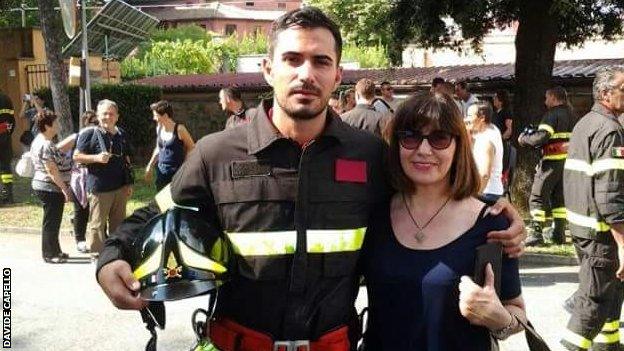
Capello, pictured with his mum, retired from football at the age of 29 in 2013
'This is a city with a big heart'
Among the crowd at Sunday's match were Andrea Fortunato and Daniela Timoneri.
On the morning of 14 August, Andrea was waiting for Daniela to come home. Their wedding was a month away and everything had been meticulously planned.
With the big day to look forward to, Andrea was one day into two weeks' holiday. Daniela was still working, but later that afternoon they were going to his grandfather's old house in the countryside, in Caranzone, 80km to the north of Genoa.
Andrea was tidying up, putting the espresso cups away, when he saw a flash of lightning from his kitchen window. Then he heard a very loud noise. His flat was almost directly under the bridge.
"It was like a bomb. I looked around but couldn't see anything, my windows don't look out to the bridge so I came out into the street," he says.
"It was raining like the apocalypse. I thought maybe there had been a gas pipe explosion, maybe a water pipe, maybe there were people working. I was worried because there is a petrol station very close by.
"I called Daniela, I asked her if she was OK and told her about what I had heard. I went to look on the other side of my building and there... a piece of the bridge was just not there any more.
"I was like a block of ice. You have the sensation that it cannot be real. I had extreme emotions. For a few minutes I thought - what would have happened if it had collapsed 45 minutes later, when Daniela was on her way back from work? She always takes the bridge."
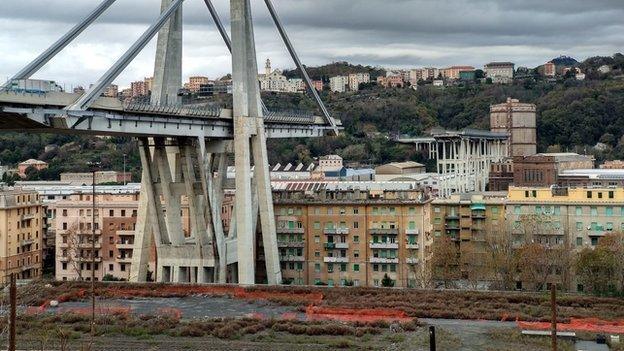
Andrea and Daniela's flat is in the building on the far right, with a yellow roof and green shutters
The emergency services turned up quickly. Andrea and Daniela's building could be crushed if any more of the bridge were to fall, they said. There was no time, they said. Just get out, and leave everything behind.
Their street, via Enrico Porro, was now cordoned off, in the red zone. The only way was through the trees, so Andrea grabbed his moped and escaped, pushing it through the flowerbeds and undergrowth in his sodden T-shirt and a pair of shorts. Hermes, their cat, was luckily already safe with Daniela's parents, in preparation for their trip away.
The couple squeezed into Andrea's parents' home. It wasn't easy but they carried on in their jobs, continued preparations for their wedding and were allowed to make two two-hour trips back to their flat, under the strict supervision of the fire brigade.
They were only allowed in if the weather was fine; there was still a risk more of the bridge would fall. An officer would lead them through it, and mark the date and duration of their visit by writing on the wall outside the flat's front door. This wasn't home any more.
Andrea, 34, and Daniela, 30, married on 17 September. Both felt it represented something more beautiful than they could have asked for. It made the front page of the city's major newspaper Il Secolo XIX. Some 566 other people had been displaced, and many saw hope and optimism in their story.
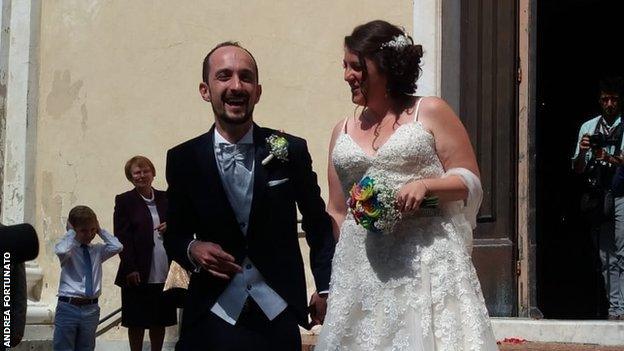
Shirts and shoes for the wedding were among the first things the couple took from their home
"Genoa is a city that has a big heart," Andrea says. "A few years ago there were very bad floods here, it was another time when a lot of people came together to work and help the community. Everything that has hit the city in recent years cannot break us."
In San Biagio, to the north of the city, the couple have just moved in to an empty flat, provided by the local government. They can return to their old house one more time before it is destroyed when the bridge is brought down. Demolition is scheduled for mid-December, and it is planned a new bridge will be completed by the spring of 2020.
For the moment their new place is all unopened boxes, and Hermes the cat is still with Daniela's mum and dad.
That they have a fridge is thanks to funds collected by Sampdoria and their federation of supporter clubs. One of several initiatives run by both the city's major teams, it raised 40,000 euros (£35,400) to help those forced to leave their homes. An avid Sampdoria fan himself, Andrea is immensely grateful.
As for the game, he says: "You win the derby with courage, strength and character. They are always special matches, but this was different.
"What happened at the Morandi bridge has created a situation of solidarity in this time. For me, the match is another symbol of rebirth and hope. That is the best emotion to have."
Divided by football but united in mourning - how the derby unfolded
The firecrackers started three hours before kick-off, echoing up and down the river valley by the stadium long enough and loud enough to scare off the family of wild boar that had strayed in for some evening grazing.
The Stadio Luigi Ferraris started life in 1911, as Genoa's ground. This year the club are celebrating their 125th anniversary - they lay claim to being Italy's oldest. When Sampdoria were formed in 1946 - as Sampierdarenese and Andrea Doria merged - they moved in too.
Outside the stadium, the most enthusiastic among each tribal set of fans gathered in their own corners, territory long since claimed for the rudest words, the loudest songs, the brightest lights.
In between was a busy normality through which walked relaxed couples split across colours; mum in Sampdoria blue, dad in Genoa red, each with a tight grasp on their child's hand and mind.
That these two rival teams share their home, even on derby day, helps to make their meetings unique. The 'Derby della Lanterna' - so named after Genoa's 12th-century lighthouse - has a nominal home and away side, but each set of supporters has a whole end of the ground to themselves, and the stands on either side are mixed.
Both clubs have done an awful lot already to support and pay tribute to victims of the Morandi bridge disaster.
Having postponed their opening fixtures of the season, the two teams attended a state funeral together, although some families of the victims stayed away, reportedly out of anger at the government over allegations of negligence.
When Genoa played Empoli on 26 August - the first home match for either of the city's sides since the disaster - fans watched the first 43 minutes in silence in tribute to those killed.
To mark a month since the collapse, both clubs halted their training sessions at 11:36 exactly, in remembrance of the tragic event.
On Sunday - three months and 11 days since the bridge fell - it seemed Genoa and Sampdoria both preferred to look forward. There was no minute's silence, no black armbands and no joint team photo. Instead, a special montage video appealed to opposite sets of fans to take pride in the city they share.
All of which lasted a very brief time indeed before the two polar ends of the stadium - the Gradinata Nord and the Gradinata Sud - picked up where they had left off, absorbed in a spectacular display of affection towards their teams.
As in so many sporting rivalries, it is an affection in no small portion defined by wild opposition to the other.
Sampdoria went ahead early. Veteran striker Fabio Quagliarella headed home from Gaston Ramirez's cross in the eighth minute.
When Krzysztof Piatek scored his 10th goal of the season to level for Genoa from the penalty spot it seemed like the momentum had shifted. There were some of the loudest noises I have heard in my life emanating from the buoyant Genoa end.
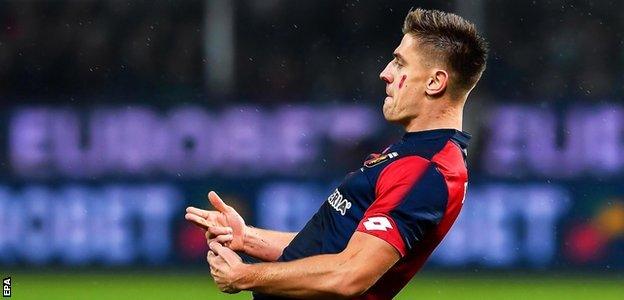
Across Italy this weekend, players have sported red marks on their face to condemn violence against women
But by the time Sampdoria keeper Emil Audero clawed out a Daniel Bress header with a daring second-half save, the roaring Genoa fans behind him and the smell of military-grade pyrotechnics thick in the air, it seemed the home side's growing stature would come to nought.
Genoa's 23-year-old Polish forward Piatek is the Serie A top scorer, although this was his first goal in six games. So when he hung in the air to meet an Oscar Hiljemark cross, there was another fizzing moment of expectation.
It pinged off the back of his head and away. Just the one goal between Piatek and Juventus' Cristiano Ronaldo at the top of the scoring charts then, and another chance gone with time running out.
Perhaps the frustration got to Genoa boss Ivan Juric. Soon afterwards he was sent off for arguing over a referee's decision. "You have no soul! This is a derby!" he was reported to have shouted in response.
At the final whistle, players from both sides went over to their supporters and threw their shirts into the stands. Genoa captain Domenico Criscito threw his shorts over too.
After a short time only the fans were left. They stayed behind to sing a little longer, and to insult each other a little more privately.
But how fitting that this derby, in a city which has shared so much, should end in a draw.